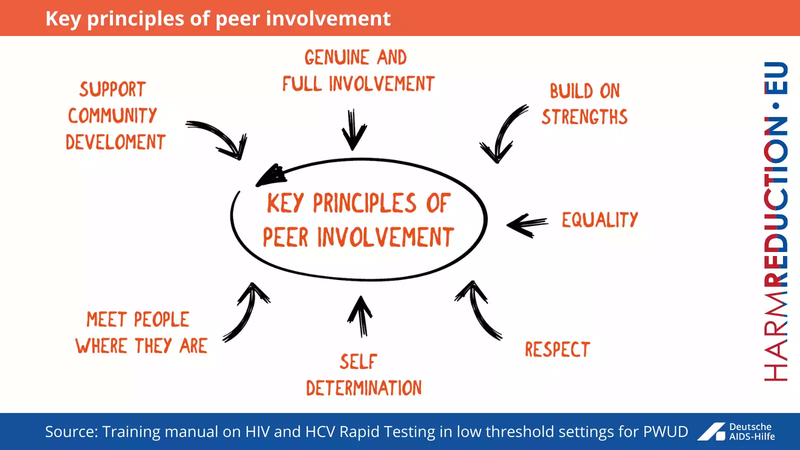Peer involvement
A large body of evidence indicates that peer-run initiatives can extend the reach and effectiveness of conventional public health programs by reaching high-risk PWUD.
The English term ‘peer,’ according to the Webster dictionary, refers to “one that is of equal standing with another; one belonging to the same societal group especially based on age, grade or status.”
A growing body of literature highlights a range of downstream social and behavioral impacts of the global emphasis of drug law enforcement. For example, fear of confrontations with police perpetuates unwillingness among PWUD to access essential HIV-related services. Pervasive stigma and the associated self-imposed isolation that often results can also render individuals reluctant to access services due to fears that family, community members, and employers may shun them for their drug using behaviors. Collectively, these barriers to HIV prevention and treatment highlight the urgent need for novel methods of healthcare delivery for this population.
In light of the ongoing problems in ensuring access to essential HIV prevention and treatment services for PWUD, task shifting could represent a key strategy to overcome social and structural barriers to HIV-related services. A large body of evidence indicates that peer-run initiatives can extend the reach and effectiveness of conventional public health programs by reaching high-risk PWUD. The recent availability of rapid HIV point-of-care testing (POCT) offers new strategies for improving the uptake of testing among PWUD in both clinical and community-based settings. Training peer leaders who use (and continue to use) drugs as HIV educators has been shown to be an effective mechanism for HIV prevention among PWUD. Furthermore, peer-delivery of testing has been done among PWUD with high levels of satisfaction and comfort with the level of confidentiality.
Accordingly, the WHO, UNODC, UNAIDS Technical Guide recommends community-based outreach methods as an essential approach for service delivery. However, the involvement of PWUD in providing HIV services need not be limited to those efforts that aim to extend the reach of existing programs and may have value in other areas. Shifting HIV services from professional healthcare workers to peers may also serve to address the existing stigma that people who use drugs experience within healthcare settings, thereby improving access to these services. By creating peer-involved HIV testing clinics and pairing physicians with peers, PWUD may be more likely to use these services without fear of being discriminated by healthcare workers or fear of being registered as drug users within official registries. Indeed, past research has shown that interventions led by people who use drugs are more acceptable to them than conventional public health programs. This is due in part to perceived acceptance of their drug use behaviors by their peers.
By shifting delivery of care from healthcare professionals to peers, or by incorporating peer workers into professionally-led services, a reduction in stigma and discrimination in these settings may be achieved. Likewise, this type of shift in service delivery may address some concerns among PWUD about information sharing between public health systems and law enforcement officials. Given the evidence indicating positive benefits of peer-led interventions for PWUD, as well as the success of task shifting in settings with human health resource shortages, shifting the delivery of conventional HIV/AIDS programs and services to PWUD themselves may serve to address the severe stigmatization and discrimination that characterizes the existing healthcare context in many settings hard hit by PWID-driven HIV epidemics. In turn, this novel approach to task shifting may foster a new era in the response to HIV among PWUD.
Organisations, that have peer workers should provide management and appropriate supervision to ensure dissemination of information is accurate and up-to-date. Peers should be compensated for their time and effort like other workers. In some countries, payment is provided at minimum level not to effect social benefits.



